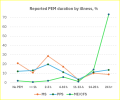Simon M
Senior Member (Voting Rights)
I think it would help PwME if we had a short questionnaire that does a good job of identifying postexertional malaise (PEM), the cardinal symptom of this illness. It could be useful in two ways:
1. Doctors, especially those in primary care, could use it to help diagnose people who have ME/CFS, and identify those who don’t have PEM, and so might have a different illness.
We know that primary care diagnoses are very slow and often wrong. Two decent studies found that around half of cases referred to specialists by GPs didn’t have ME/CFS, mostly because people instead had another illness, psychological or biomedical. One study was led by Julian Newton, the other by Peter White, but both identified the same problem. This study found that nearly half of GPs say they find ME/CFS hard to diagnose
2. Researchers could use it to see if people who self-report a diagnosis of ME/CFS, or have a GP-given diagnosis, have PEM, to make sure that they are identifying ME/CFS cases for their research (DecodeME did this).
Any questionnaire should be short, freely available, and validated to have high sensitivity for identifying almost all true cases and high specificity for excluding people with other illnesses without PEM, but who might have related issues such as exertion intolerance.
Currently, there is no tool available to help with this: the latest DePaul PEM questionnaire (Jason & Chee, 2025) is criticised in this thread as not capturing the true nature of PEM well, and it is also quite lengthy and complicated.
How could we do this?
This is likely to be a lot of work. We’d need to come up with good questions endorsed by PwME and show that it could discriminate between ME/CFS and other illnesses. That means collecting data on ME/CFS and other chronic illnesses. We don’t know to what extent PEM exists in other illnesses, so there is probably a lot of groundwork to do here. @ME/CFS Science Blog produced a helpful outline of how we might go about this.
I hope this thread will start a discussion on whether and how we could take this forward. I agree with others that we would need to collaborate with a researcher to make this happen. But I suspect there's a lot of useful discussion we can have here first. Due to my poor health, I won't be able to contribute much myself.
[Thanks to all those who engaged with the suggestion for a new questionnaire on the original thread, especially @Trish, who suggested similar questions to me, and produced the comprehensive S4ME PEM Factsheet; @ME/CFS Science Blog who said they were happy to collaborate (and see above re methodology); and @Bivox (Krisitian Sommerfelt), who shared his clinical experience on identifying and understanding PEM.]
1. Doctors, especially those in primary care, could use it to help diagnose people who have ME/CFS, and identify those who don’t have PEM, and so might have a different illness.
We know that primary care diagnoses are very slow and often wrong. Two decent studies found that around half of cases referred to specialists by GPs didn’t have ME/CFS, mostly because people instead had another illness, psychological or biomedical. One study was led by Julian Newton, the other by Peter White, but both identified the same problem. This study found that nearly half of GPs say they find ME/CFS hard to diagnose
2. Researchers could use it to see if people who self-report a diagnosis of ME/CFS, or have a GP-given diagnosis, have PEM, to make sure that they are identifying ME/CFS cases for their research (DecodeME did this).
Any questionnaire should be short, freely available, and validated to have high sensitivity for identifying almost all true cases and high specificity for excluding people with other illnesses without PEM, but who might have related issues such as exertion intolerance.
Currently, there is no tool available to help with this: the latest DePaul PEM questionnaire (Jason & Chee, 2025) is criticised in this thread as not capturing the true nature of PEM well, and it is also quite lengthy and complicated.
How could we do this?
This is likely to be a lot of work. We’d need to come up with good questions endorsed by PwME and show that it could discriminate between ME/CFS and other illnesses. That means collecting data on ME/CFS and other chronic illnesses. We don’t know to what extent PEM exists in other illnesses, so there is probably a lot of groundwork to do here. @ME/CFS Science Blog produced a helpful outline of how we might go about this.
I hope this thread will start a discussion on whether and how we could take this forward. I agree with others that we would need to collaborate with a researcher to make this happen. But I suspect there's a lot of useful discussion we can have here first. Due to my poor health, I won't be able to contribute much myself.
[Thanks to all those who engaged with the suggestion for a new questionnaire on the original thread, especially @Trish, who suggested similar questions to me, and produced the comprehensive S4ME PEM Factsheet; @ME/CFS Science Blog who said they were happy to collaborate (and see above re methodology); and @Bivox (Krisitian Sommerfelt), who shared his clinical experience on identifying and understanding PEM.]
Last edited:

